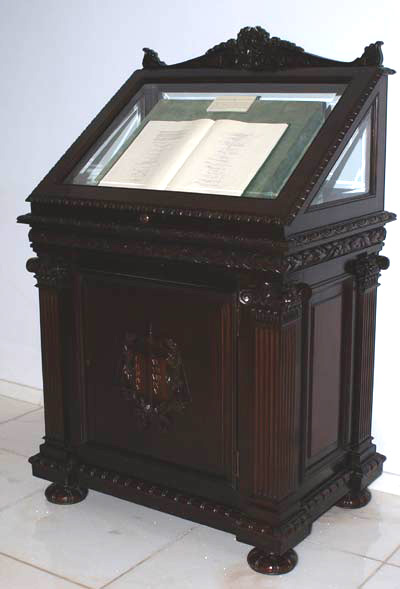|
AI-5
The Ato Institucional Número Cinco – AI-5 ( en, Institutional Act Number Five) was the fifth of seventeen major decrees issued by the military dictatorship in the years following the 1964 coup d'état in Brazil. ''Institutional Acts'' were the highest form of legislation during the military regime, given that they overruled even the highly authoritarian Constitution, and were enforced without the possibility of judicial review. They were issued on behalf of the "Supreme Command of the Revolution" (the regime's leadership). AI-5, the most infamous of all Institutional Acts, was issued by dictator Artur da Costa e Silva, president at the time on December 13, 1968. It resulted in the forfeiture of mandates, interventions ordered by the President in municipalities and states and also in the suspension of any constitutional guarantees which eventually resulted in the institutionalization of the torture commonly used as a tool by the State. Written by then Minister of Justice, L ... [...More Info...] [...Related Items...] OR: [Wikipedia] [Google] [Baidu] |
Costa E Silva
Artur da Costa e Silva (; 3 October 1899 – 17 December 1969) was a Brazilian Army Marshal and the second president of the Brazilian military government that came to power after the 1964 coup d'état. He reached the rank of Marshal of the Brazilian Army, and held the post of Minister of War in the military government of President Castelo Branco. During his term in office Institutional Act 5 was promulgated. This law gave the President powers to dismiss the National Congress, strip politicians of their offices of power, and institutionalize repressive methods of rule against left-wing parties and individuals. Costa e Silva's government started the most oppressive stage of the military regime against opposition, left-wing activists and suspected communists, which would be continued and expanded under his successor Emílio Garrastazu Médici. Early life Birth Costa e Silva was born in Taquari in Rio Grande do Sul state on 3 October 1899. While several sources erroneous ... [...More Info...] [...Related Items...] OR: [Wikipedia] [Google] [Baidu] |
Military Dictatorship In Brazil
The military dictatorship in Brazil ( pt, ditadura militar) was established on 1 April 1964, after a coup d'état by the Brazilian Armed Forces, with support from the United States government, against President João Goulart. The Brazilian dictatorship lasted for 21 years, until 15 March 1985. The military coup was fomented by José de Magalhães Pinto, Adhemar de Barros, and Carlos Lacerda (who had already participated in the conspiracy to depose Getúlio Vargas in 1945), then governors of the states of Minas Gerais, São Paulo, and Guanabara, respectively. The coup was planned and executed by the most forefront commanders of the Brazilian Army and received the support of almost all high-ranking members of the military, along with conservative elements in society, like the Catholic Church and anti-communist civil movements among the Brazilian middle and upper classes. Internationally, it was supported by the State Department of the United States through its embassy in Bras ... [...More Info...] [...Related Items...] OR: [Wikipedia] [Google] [Baidu] |
National Renewal Alliance Party
The National Renewal Alliance ( Portuguese: ''Aliança Renovadora Nacional'', ARENA) was a far-right political party that existed in Brazil between 1966 and 1979. It was the official party of the military dictatorship that ruled Brazil from 1964 to 1985. ARENA was part of a two-party system enforced by the dictadorship instituted on 1966, where only it and the Brazilian Democratic Movement (MDB) — the "consented opposition" — were allowed. On 1979, a multi-party system was reintroduced to Brazil, both MDB and ARENA were officially dissolved, and the Democratic Social Party (PDS) was founded as a continuation of ARENA. Soon thereafter, PDS had a split which saw the creation of the Liberal Front Party (PFL), current Brazil Union (UNIÃO), while PDS merged with the PDC in 1993 became the Reform Progressive Party (PPR), which became the current Progressives (PP) on 1995. History Up to 1965, there were three main parties in Brazil: the populist Brazilian Labour Party (PTB) ... [...More Info...] [...Related Items...] OR: [Wikipedia] [Google] [Baidu] |
Márcio Moreira Alves
Márcio Emanuel Moreira Alves (July 14, 1936 – April 3, 2009) was a Brazilian journalist and politician. Early life Márcio Moreira Alves was born in 1936; his father was the former mayor of the city of Petrópolis Márcio Honorato Moreira Alves. His family owned the Ambassador Hotel in Rio de Janeiro, where Juca's Bar, a meeting place for intellectuals and politicians in the 1960s, operated. Marcito, as he was known, began his career in journalism at the age of seventeen as a reporter for the newspaper '' Correio da Manhã'' and was awarded the Esso Journalism Award for his work on the political crisis in Alagoas in 1957. Between 1958 and 1963, he attended the Law School of the Guanabara State University (current UERJ). He was an advisor to the Minister of Foreign Affairs between 1961 and 1962, San Tiago Dantas.https://cpdoc.fgv.br/producao/dossies/Jango/biografias/marcio_moreira_alves Political activism A member of the opposition to the government of President Joã ... [...More Info...] [...Related Items...] OR: [Wikipedia] [Google] [Baidu] |
National Archives Of Brazil
The National Archives of Brazil ( pt, Arquivo Nacional, AN) were created in 1838 as the Imperial Public Archives. The Archives were renamed in 1911, and are located in Rio de Janeiro. The National Archives of Brazil is the Brazilian institution responsible for the management, preservation and dissemination of federal government documents. Since 2011, it is subordinated to the Ministry of Justice and Public Security. The AN has the following responsibilities, according to the Decree No. 9,360 of May 7, 2018, which grants it as the main body of Archival Documents Management System (in Portuguese: Sistema de Gestão de Documentos de Arquivo – SIGA) of the federal government: "to guide the main organizations and entities of the federal Executive Power in the implementation of document management programs; oversee the application of procedures and technical operations related to the production, registration, classification, control of the processing, use and evaluation of documents, ... [...More Info...] [...Related Items...] OR: [Wikipedia] [Google] [Baidu] |
1968 In Brazil
Events of the year 1968 in Brazil Incumbents Federal government * President: Marshal Artur da Costa e Silva * Vice-President: Pedro Aleixo Governors * Acre: vacant * Alagoas: Antônio Simeão de Lamenha Filho * Amazonas: Danilo Duarte de Matos Areosa * Bahia: Luís Viana Filho * Ceará: Plácido Castelo * Espírito Santo: Cristiano Dias Lopes Filho * Goiás: Otávio Lage * Guanabara: Francisco Negrão de Lima * Maranhão: Jose Sarney * Mato Grosso: Pedro Pedrossian * Minas Gerais: Israel Pinheiro da Silva * Pará: Alacid Nunes * Paraíba: João Agripino Maia * Paraná: Pablo Cruz Pimentel * Pernambuco: Nilo Coelho * Piauí: Helvídio Nunes * Rio de Janeiro: Geremias Fontes * Rio Grande do Norte: Walfredo Gurgel Dantas * Rio Grande do Sul: Walter Peracchi Barcelos * Santa Catarina: Ivo Silveira * São Paulo: Roberto Costa de Abreu Sodré * Sergipe: Lourival Baptista Vice governors * Alagoas: Manoel Sampaio Luz * Amazonas: Rui Arajuo * Bahia: J ... [...More Info...] [...Related Items...] OR: [Wikipedia] [Google] [Baidu] |
Edson Luís De Lima Souto
Edson Luís de Lima Souto (; February 24, 1950 – March 28, 1968) was a Brazilian teenage student killed by the military police of Rio de Janeiro after a confrontation in the restaurant Calabouço (), in downtown Rio de Janeiro. Edson was one of the first students to be killed by the Brazilian military government, and the aftermath of his death marked the beginning of a turbulent year for the regime, which ended with the enactment of AI-5, a decree restricting most of the basic human rights guarantees. Biography Born into an impoverished family of Belém, Pará, Edson Luís began his studies at the Augusto Meira State School in his hometown. He later moved to Rio de Janeiro in order to study at the Instituto Cooperativo de Ensino ( en, Cooperative Education Institute), a high school facility where the Calabouço restaurant for low-income students operated. Death On March 28, 1968, students in Rio de Janeiro organized a surprise march to protest against the high prices of meal ... [...More Info...] [...Related Items...] OR: [Wikipedia] [Google] [Baidu] |
Ernesto Geisel
Ernesto Beckmann Geisel (, ; 3 August 1907 – 12 September 1996) was a Brazilian Army officer and politician, who was President of Brazil from 1974 to 1979, during the Brazilian military regime. Early life and family Ernesto Geisel was born in Bento Gonçalves, Rio Grande do Sul province. His father was Guilherme Augusto Geisel (born Wilhelm August Geisel), a German Brazilian teacher from Herborn who immigrated to the Empire of Brazil in 1883 at age 16. His mother was the homemaker Lydia Beckmann, born in Brazil in Teutônia colony to German parents from Osnabrück. In Bento Gonçalves, where Ernesto was raised, there were only two families of German origin (Geisels and Drehers), and most of the population was composed of Italian immigrants. Remembering the contact with the local Italian immigrants during his childhood Geisel described the cultural contrasts between the strict and rigorous education that his German parents imposed compared to the freedom and more relaxed w ... [...More Info...] [...Related Items...] OR: [Wikipedia] [Google] [Baidu] |
Brazil
Brazil ( pt, Brasil; ), officially the Federative Republic of Brazil (Portuguese: ), is the largest country in both South America and Latin America. At and with over 217 million people, Brazil is the world's fifth-largest country by area and the seventh most populous. Its capital is Brasília, and its most populous city is São Paulo. The federation is composed of the union of the 26 states and the Federal District. It is the largest country to have Portuguese as an official language and the only one in the Americas; one of the most multicultural and ethnically diverse nations, due to over a century of mass immigration from around the world; and the most populous Roman Catholic-majority country. Bounded by the Atlantic Ocean on the east, Brazil has a coastline of . It borders all other countries and territories in South America except Ecuador and Chile and covers roughly half of the continent's land area. Its Amazon basin includes a vast tropical forest, ho ... [...More Info...] [...Related Items...] OR: [Wikipedia] [Google] [Baidu] |
Constitution Of Brazil
The Constitution of the Federative Republic of Brazil ( pt, Constituição da República Federativa do Brasil) is the supreme law of Brazil. It is the foundation and source of the legal authority underlying the existence of Brazil and the federal government of Brazil. It provides the framework for the organization of the Brazilian government and for the relationship of the federal government to the states, to citizens, and to all people within Brazil. Overview The current Brazilian Constitution is the seventh enacted since the country's independence in 1822, and the sixth since the proclamation of the republic in 1889. It was promulgated on 5 October 1988, after a two-year process in which it was written from scratch. History The current Constitution of Brazil was drafted as a reaction to the period of military dictatorship, and sought to guarantee individual rights and restrict the state's ability to limit freedom, to punish offences and to regulate individual life. Among ... [...More Info...] [...Related Items...] OR: [Wikipedia] [Google] [Baidu] |




